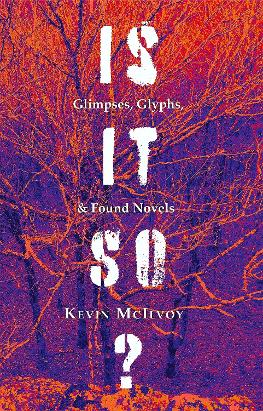Book Review
A good writer can always envision the end for his characters and his books, but the exceptional artist can imagine even his own exit.
In the story “Cake All Day,” Kevin McIlvoy captures the whimsical conversation between a writer and an elderly sister-in-law living with Alzheimer’s at a senior facility. This odd couple talk about how much they enjoy cake and the eating of it in an easy yet unsentimental banter. But McIlvoy quickly raises the stakes of his story, inserting a literally heart-stopping moment.
“This particular April First was only different than the other days because on this day his heart would not start, would crank, crank-cough, almost rev, crank, stop, go silent, go down beyond recharging in the Center’s parking lot right after his visit with Dorothy Eva during which every cell of him had been recharged with life and had seemed to hold the charge but in one gasp-laugh-cough had gone silent.”
Fiction holds an uncanny mirror to life. Kevin McIlvoy, affectionately known as “Mc” to his family, friends, and students, died on September 30, 2022, felled by a heart attack while playing his favorite pastime on the tennis courts. He was 69 years old.
That summer, McIlvoy had put the finishing touches on this final collection Is It So? Glyphs, Glimpses and Found Novels now out from WTAW Press. Death is not far from these stories, but neither is Life itself. McIlvoy mourns his losses and fills the pages with his constant wonder and awe, the joy of being attentive to this strange world.
McIlvoy classifies these prose pieces as glimpses, glyphs and found novels. The glimpses follow the outlines of conventional short stories while the glyphs veer more into poetry. The found novels are the shortest, with brief descriptions of objects from a deserted fictional town of Desordenada, North Carolina that suggest whole worlds. The name itself Desordenada shows McIlvoy’s trademark wordplay with echoes of “disorder” and “nada” or nothingness.
For McIlvoy, writing fiction wasn’t about offering ready-made answers of plot or circumstance, but always asking himself the hard question – is this really so? He tuned into the self-talk of his characters, grounding the point of view deep inside those eddying streams of thought. Rather than just clever wordplay, McIlvoy’s inventions feel truer to our experiences of Life and Death.
With the story “In the Gilla,” the narrator returns regularly to a protected wilderness to hike and ski, resuming his odd annual conversations with the resident ranger. We see the two men, their features superimposed like ghosts over the glass plate covering the area map. The ranger gently corrects the narrator’s constant questions, even his vision trying to pinpoint trees and fire sites on the map. “You’re too small in the big picture of things at the unimaginable scale … you don’t see what you should.”
Call it a student’s revenge and a teacher’s hard-learned lesson. Turns out the forest ranger was a former student of the narrator, still smarting over the “D” he got in Freshman Composition decades before. Old age and outdoor trekking won’t bring the narrator any closer to any wisdom. He learns instead to say no to his own romantic bullshit.
“The trails lost, buried, burned. I came in order to bring my wilderness to this wilderness. No. No to that assessment’s shapeliness, the kind of thing one writes who is the sole audience for anything he writes. I was in fact an ignorant young and lost wanderer who had become an ignorant lost and old wanderer.”
Mc once told me that true artists are comfortable with making mistakes. Ask Mc a direct question and like Zen masters of old, he would chuckle, deflect then humbly offer his thoughts. Working with students and other writers, he would offer suggestions on how to make the prose not just mundanely say the next obvious thing, but to sing, to stutter, to fall silent.
Over his career of eight published books, McIlvoy blurred the boundaries between well-made conventional narratives and lyric flights of poetry. He gravitated toward wisdom literature, telling new parables and paradoxes, reminiscent of Basho and Zen Masters to Kafka and Borges. He was always after the kind of communication that get us closer to the unsayable.
In these short pieces, Jesus returns as a homeless man asking for a drink of water in a writer’s garden. A writer tries to describe the beauty of a goldfish in a plastic bag transported by a woman on a bus. “Passerby” is a moment-by-moment breakdown of each extra’s appearance in Gene Kelly’s signature dance in the 1952 movie musical Singing in the Rain.
We get glimpses of larger plots, freeze-frames of lost time and untold stories, but mainly McIlvoy returns to his own ghosts and griefs, revenants and presences that haunt him, especially his own family members and even his nation.
In “Let us Draw Near,” McIlvoy grabs the reader with the opening line “10 days after 9/11, my father’s heart exploded, his life collapsing in a matter of moments.” His losses only mount a few stanzas or paragraphs later with the death of his younger sister, an alcoholic who succumbs to her disease at age 52.
We meet their presence again in “Prose Poem at Sunrise” about a father’s favorite oil painting, a bad piece of art depicting his beloved golf course. “The thing has character,” the father would insist, and we see clearly a writer trying to make a shapely piece of art as a tribute to his dad.
McIlvoy championed what he called the literature of “fullness,”
those stories celebrating centrifugal energies that resist finding
a center. . . . His was not the conventional hero’s journey, but the
seer’s inner voyage, the act of sitting quietly, listening deeply,
noticing more closely, getting comfortable with silences and stillness.
Meanwhile, the narrator attends a wake for Mr. Jabbok in his beloved but wrecked garden. He tries to describe the surrounding ghostly shapes, “fog devils” that edge out of the woods into the human clearing.

Dale Neal is the author of the novel Kings of Coweetsee, coming in summer, 2024. His other novels include Appalachian Book of the Dead, shortlisted for the Thomas Wolfe Literary Award; Cow Across America, winner of the Novello Literary Award; and The Half-Life of Home. His short stories, essays, and reviews have appeared in Our State, Smoky Mountain Living, North Carolina Literary Review, Appalachian Journal, Carolina Quarterly and elsewhere. He earned an MFA in creative writing at Warren Wilson College. A retired journalist, he lives in Asheville, North Carolina.
_____________________________________________
Home Archives Fiction Poetry Creative Nonfiction Interview
Featured Artist Reviews Multimedia Masthead Submit
_____________________________________________

